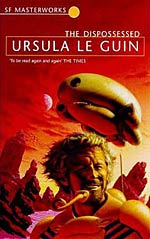
![]() jfrantz
jfrantz
7/24/2012
![]()
Urras and Annares are twin inhabited planets within the same universe as that of her first Hugo winner, The Left Hand of Darkness. Here Shevek, a physics prodigy with a philosophical bent, is working to develop an engine that will enable faster-than-light travel. At the same time, he is forced to negotiate hard famine and the politics of academia in a less-than-perfect anarchist state. The journey confronts him with the endless walls societies build to keep each other out, but end up caging themselves in, in the process.
An Ambiguous Utopia
I wish I had read this as a teenager. At that time in our lives, so many, especially myself, are searching for, hoping for that utopia in which the world always makes sense and offers a "completeness of being". Had I read Shevek's exploration for the same and Le Guin's notion of the imperfect utopia at that time in my life, it would have been absolutely earth-shattering. At the same time, it is also probably a good thing that I didn't read it as a teenager, because there is just so much depth that I'm not sure I would have appreciated it, or if I could I might have drowned in it.
Once again, Le Guin creates an intensely rich universe. Neither Annaresti nor Urrasti society or culture live up to their ideals, and nor do they devolve to the evil they predict of each other. The result is a dark philosophy of pragmatism and responsibility. It is so subtle as to knock down the cultural walls we build against each other, but rather than leaving us in a vacuum, there is a bittersweet fulfillment in its place. It is a story of love and collective responsibility which offers an intensely and intellectually satisfying response to both the absurdism and multitudinous dystopias drowning SF to that point.
Le Guin's Intellectualism
To say The Dispossessedis intellectually challenging would be inappropriately understated. As with The Left Hand of Darkness, The Dispossessedembodies so many aspects of feminism at the time. It is a work of political and cultural theory, semiotics, physics and ethics which seeks to not only make sense of who we are, but also to explore more satisfying human relationships. To read this book is to think long and hard. The negative here may be that more so even than TLHoD, The Dispossessed does at times, tend to lecture and patronize and leaves characters a little stiff for relying on a scientific and academic approach to storytelling, but Le Guin is again able to back that up with real substance, chewy and interwoven philosophies...heavenly bliss for the academic and philosophically minded.
Recommendation
I started this book a little worried that Le Guin might fall into the Heinleinesque "ultra-preachyness" that I find so deplorable. That concern didn't last long though and I ended the book with a feeling of satisfaction that I can't begin to compare to any other reading experience I've ever had. Well maybe a couple...but the point is that with The Dispossessed, Le Guin established herself as the eternal scholar and intellectual savior of the genre.
http://hugoenduranceproject.blogspot.com/2012/07/the-dispossessed.html